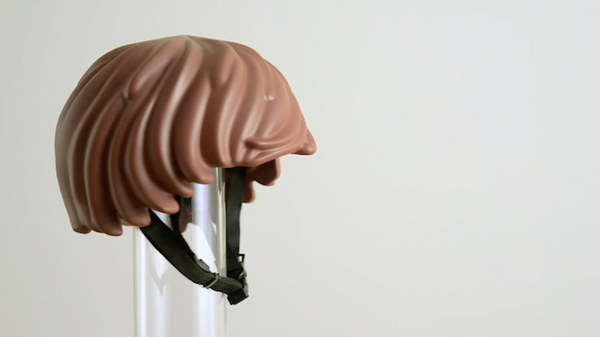
A few years ago, a video featuring an odd-looking innovation went viral. The innovation was called the Hövding, and it was a bike helmet airbag — a pouch cyclists would wear around the neck that contained a mechanism designed to inflate an airbag rapidly during a crash scenario.
Watching a bike helmet airbag deploy is fascinating. If it weren't for the fact that it activates in life-or-death situations, it would be comical. (Check out Hövding'svideo series "Will It Pop" to see what we mean). The airbag bursts out from the back of the neck pouch, swoops up over the back of the head and cradles the cyclist's noggin like a giant, inflatable hand. But how effective is it when it comes to protecting against traumatic brain injuries?
Advertisement
According toStanford researchers, the answer is "very effective." The researchers took bike helmet airbags as well as traditional bike helmets and strapped them onto mannequin heads. They suspended the mannequin heads upside down several feet over a hard surface and then dropped them. The heads had sensors in them to measure changes in acceleration. The researchers found that the airbags reduced acceleration impact by up to a factor of five. You can see the Stanford team testing the airbags inthis video.
That means a bike helmet airbag could be more effective than a normal bike helmet at protecting cyclists fromconcussions. Traditional helmets are meant to prevent skull fractures, not concussions. But you can suffer a concussion simply from drastic changes in acceleration. Your brain can twist, stretch or collide with the interior of your skull. This causes chemical changes in your brain, and the effects can be serious and long-lasting.
A standard bike helmet isn't capable of minimizing those changes in acceleration, but an inflated helmet can. The airbag absorbs some of the impact, cushioning the cyclist's head and decreasing the acceleration forces significantly. The researchers concluded that the result was that a cyclist wearing an airbag bike helmet was eight times less likely to suffer a concussion from a serious accident compared to someone wearing a standard bike helmet (which the study defined as one being made of expanded polystyrene foam).
According to Stanford researcher David Camarillo, this would help address a growing problem. Camarillo quotes the Centers for Disease Control and Prevention, which says people receive more concussions from cycling than from any other sports activity (here's arelated CDC study尽管值得注意的是它pplies to people 19 years old or younger). That doesn't mean cycling is inherently more dangerous than full-contact football. More people ride bicycles than play contact sports, so from a sheer numbers perspective you would expect more concussions. But dangerous or not, a device that could protect cyclists from receiving a concussion would be great.
So does that mean bike helmet airbags are superior to ordinary bike helmets? That's not clear. They may protect against concussions, but additional tests are needed to see how well they protect against skull fractures. They are also not legal alternatives to traditional helmets in many countries. To make them legal, we'd need to create basic standards airbag helmets must meet.
最重要的是,安全气囊需要经过rigorous testing to make certain the deployment mechanism works quickly, safely and under the right circumstances. You wouldn't want a bike helmet airbag to deploy if you just hit a bump in the road or leaned a bit into a turn. A misfire could actually cause an accident rather than protect someone in the event of one. And you'd have to make certain the airbag was reliable. A failure to deploy could be tragic.
For now, you may see bike helmet airbags in certain European countries like Sweden. But we may have to wait a while before the technology makes its way to other parts of the world.
Advertisement





